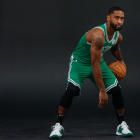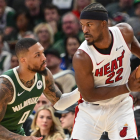Last season was "probably the toughest mental stage of my life, as far as basketball-wise," Boston Celtics guard Brad Wanamaker said. He appeared in only 36 games, logging double-digit minutes just 12 times. Every day, he hoped something would change.
This is standard procedure for an ordinary rookie on a team with championship aspirations, but Wanamaker was decidedly not that. He had spent the previous seven years hopping all over Europe, building an international career. Boston signed him away from Turkish powerhouse Fenerbahçe and sat the Euroleague star at the end of the bench.
"It was the first time I felt like basketball was taken away from me."
In January, thanks to an injury to Kyrie Irving, Wanamaker made a rare non-garbage-time appearance and made a couple of 3-pointers. A reporter asked him what the shots did for his confidence as a young player. Wanamaker informed the reporter that he was 29 years old.
Staying positive was a challenge, but he did his best. "It was dope to be in the NBA 'cause I always dreamed of it," he said, but "to not get a chance at all was pretty tough." The roster was stacked with proven players, and he understood that the coaching staff was having trouble diving minutes and touches among them. "He never complained," guard Marcus Smart said. Basketball was Wanamaker's first love, but it wasn't his only love -- he found joy away from the gym, with his family.
Wanamaker's second NBA season has been a wildly different story. Twenty games in, Wanamaker eclipsed last year's minutes total. He has played every game for the 17-6 Celtics, averaging 7.5 points, 2.8 assists and 2.1 rebounds in 18 minutes while shooting 46.7 percent from the field and 40 percent from deep.
In no way is Wanamaker the driving force behind Boston's success, but he has been exactly the kind of role player the Celtics needed. Through injuries to Gordon Hayward and now Smart, the 6-foot-3 combo guard has kept them steady.
Smart and center Daniel Theis, a teammate in Boston and ex-teammate with Brose Bamberg in Germany, each rattled off a list of Wanamaker's positive attributes. They mentioned energy, ball-handling, rebounding, the way he keeps defenders on their toes, the way he uses his body on defense, his size, his strength, his smarts. Wanamaker does not care about touches, but he can run the team, hit catch-and-shoot 3s and attack close-outs.
"He's just giving the team whatever the team needs in the moment," Theis said.
Sometimes, that means pushing the ball for a transition layup. Other times, it is just a sense of calm, the seasoned vet helping Boston stop a run or start one of its own. Rookie forward Grant Williams said he consistently "brings a spark" in one form or another.
"He's a guy that has grown-man strength," Williams said. "He's like 55 years old, I think. So he comes in during the game and just gives us a different intensity. Something that Kemba [Walker] brings is that quickness and that speed and that ability to pull up off the dribble, and then Brad comes in with the sturdy, grown-man, low-man game. With no dunks in the world."
It always feels good, Wanamaker said, to get an opportunity to play and contribute.
The Celtics reached out to Wanamaker in June 2018. He was in the middle of the Basketball Super League finals. At first, he hesitated. Leaving Istanbul for Boston was a risk.
NBA teams had called "two or three years in a row," Wanamaker said, but he had always wound up deferring his dream. If he were to sign a minimum contract with the Celtics, he would be taking a significant pay cut, and he "didn't want what happened last year to happen."
Wanamaker liked Boston's style of play, and he liked how coach Brad Stevens had used guard Shane Larkin the year before. He already knew Theis. It felt right.
"F it," Wanamaker told himself. "Why not?"
It turned out that the 2018-19 Celtics had "a different dynamic" than they did in previous years under Stevens, Wanamaker said. "Way different." Wanamaker joined a team that had a toxic environment, that didn't have fun even when it was winning, that played like a bunch of individuals instead of a collective unit -- and that was just how the players described it.
Wanamaker had experience, however, adjusting to difficult situations. Eight months removed from the 2011 NCAA Tournament, he had no idea what to expect when he arrived in Teramo, Italy. After going undrafted out of the University of Pittsburgh, he split his first professional season between two Italian teams and the Austin Toros of the NBA D-League (now the G League's Austin Spurs). Then it was off to Limgoes, France, for the 2012-13 season, and back to Italy with Pistoia the following year.
"It was so new to me," Wanamaker said. "It was foreign. Things I'd never seen before, the way they dealt with the team, two-a-day practices, coaches constantly on you like every single play. It was so demanding."
At first, he said, he was "all about the NBA." Eventually, though, he started thinking differently. In 2014-15, his first season with Bamberg, he played in the Eurocup and took home a German BBL championship and a Finals MVP trophy. Bamberg repeated the next season, and Wanamaker won BBL MVP.
"He took the hard way, the hard grind," Theis said. "Just starting on a small team, low division, then he just worked his way up."
Once Wanamaker understood what coaches wanted from him, he got more comfortable on the court. He "became a student of the game," he said, and he turned himself into a point guard.
"It was kind of like relearning basketball over again," Wanamaker said. "The Europeans play basketball very fundamentally sound. Coaches over there, I played for some big-time coaches, and they're all about making the right play over and over and over again."
By the time he was in Istanbul, playing for David Blatt with Darüşşafaka and then Željko Obradović with Fenerbahçe, he had long since reframed those intense Italian practices as character-building. He had also dropped his all-about-the-NBA mindset.
"I started playing on bigger teams, obviously making great money, taking care of my family," Wanamaker said. "And I was really enjoying it over there. So I kind of got used to the culture over there and I was like, if this is where I'm going to be, why not be the best I can be?"
Every American player who plays internationally knows that, to the vast majority of people back home, he might as well have been on another planet. Most have no clue what it means to make the All-Euroleague team. "There's something about us Americans," he said. "People say we're stuck in our own bubble." He wishes that more players would be willing to do what he did instead of spending years in the G League, waiting for a call-up.
"You can go over there, make a living, live in a different country, experience a whole new culture and make probably four times what you'll make in the G League," he said.
At a Celtics practice in late November, players discussed the differences between the European game and the NBA. The conversation started because Shane Larkin had scored a Euroleague-record 49 points for Anadolu Efes. Wanamaker, naturally, had plenty to say.
"There's no defensive three seconds over there, so the big can just stay there all day and teams can zone up all day," Wanamaker said. "The court is way bigger here. A lot more space, a lot more freedom. When you beat your man, you have more wiggle room to get downhill."
Wanamaker is no longer near the top of the opposing team's scouting report, but his time overseas taught him how to play systematic basketball like the Celtics do, how to be valuable to a team with and without the ball in his hands. In retrospect, Wanamaker was not wrong when he pegged Boston as a natural fit. He just signed at the wrong time. With a clearer hierarchy, a new leadership structure and fewer players who need the ball, last season's bad vibes are gone.
"The biggest thing is our team is unselfish," Williams said."We listen to each other. We're doing a good job of communicating, and we're learning each other day by day. [Wanamaker] has done a great job of speaking up."
If last summer had played out differently, Wanamaker's teammates could be speaking different languages. Fenerbahçe wanted to bring Wanamaker back after his first year with the Celtics. Other high-level European teams made overtures, too. Boston offered him another one-year deal with a radically remade roster, but Stevens made no promises about playing time.
Wanamaker knew what the safe route was, but did not want to leave the best league in the world with a bad taste in his mouth, nor did he want to have any regrets. If Year 2 did not go well, Wanamaker told himself he would accept that the NBA was not for him.
Smart said that Wanamaker has "always been ready," adding that "Brad could have easily said, 'Hey, I've done this overseas,'" and handled his first year less professionally. Smart commended him for sticking it out in Europe, for giving the Celtics another shot: "I know I'm proud of him. His team is proud of him."
Williams may call him "Old Man Pops," but at 30 years old Wanamaker is actually in his prime, and he is where he wants to be. To get there he just needed almost a decade's worth of persistence, writing a story with so many twists and turns and trials that the word journeyman doesn't cut it.
"But that's behind me now," Wanamaker said. "I'm trying to take advantage of what's ahead."






















